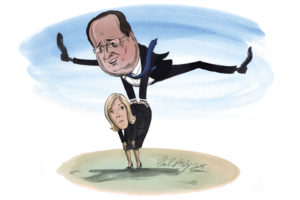By Greg Oxley
In April and May of this year, the presidential and legislative elections will be held in France. The Socialist Party has been in power for the last five years, under the presidency of François Hollande. It is not certain who will win the presidential election, which involves two rounds. What is certain, however, is that the vicious austerity policies and attacks on workers’ rights carried out by Hollande has led to a strengthening of all the right-wing parties, and especially of the nationalist and racist National Front, led by Marine Le Pen.
Previous socialist governments had supported capitalist interests on all fundamental questions, but they also introduced some positive reforms. The Jospin government (1997-2002), for instance, privatised more than 30 billion euros of public assets, but also introduced legislation reducing the working week from 39 to 35 hours. However, the Hollande government has not introduced a single significant reform in the interests of working people. The El Khomri law, named after the minister who designed it, was a direct attack on the few remaining legal safeguards for workers in the private sector. Trade unionists have been regularly arrested and tried on criminal charges. The riot police have been sent against demonstrations. A State of Emergency is in force, strengthening the arbitrary powers of the police and the secret services. In the international sphere, Hollande pursued an aggressive militarist and imperialist policy. Living standards have fallen for the vast majority of the population. Unemployment has risen sharply. The gradual decline of industry has continued. Thus the ground has been prepared for a right-wing majority in the next parliament, whoever the president may be.
The nomination of Benoît Hamon as the Socialist Party candidate does not signify a change in the political orientation of the Socialist Party. The articles in the foreign press comparing him to Jeremy Corbyn of the British Labour Party are frivolous, to say the least. Hamon supported the policy of Hollande on all fundamental questions. He approved the overall economic policy of the government but considered, together with a few other socialist leaders, that the cuts in public spending were more severe than necessary. He voted for the State of Emergency and increased powers for the police. He supported imperialist intervention in Libya, Mali, Syria and Iraq. Being slightly to the “left” of the Socialist Party leadership – which is not very difficult – enabled him to be elected as the candidate in the “primary”, that is to say, on the basis of Socialist Party voters. However, within the party itself, Hamon has hardly any support among members of parliament and mayors. He is in a minority in the leading bodies and even among party members. His own party has rejected the more radical elements of his programme and he has appointed a number of prominent right-wingers to his campaign committee. Under these conditions, and given Hamon’s record of conciliatory opportunism, it is clear that a new socialist government under his leadership would be no different to that of Hollande. Let us remember that during the 2012 election campaign, Hollande declared that he would impose a 75% tax on the rich and that his “only enemy” in society was finance capital. The tax was never applied, and representatives of finance capital such as Macron were included in his ministry. The latest polls put Hamon at only 15% of the vote.
The fact that the collapse in support for the Socialist Party has led to a strengthening of the right and not of the political parties of the left requires some explanation. The Communist Party (PCF), rather than gaining ground, has been seriously weakened. In 1996, the PCF had 274,000 members. Ten years later this figure was down to 130,000. Today it stands at 53,000. The much smaller Left Party, led by Jean-Luc Mélenchon, is also declining. If either of these parties had fought the government on the basis of a serious revolutionary programme, they may not have immediately prevented the swing to the right, but they would certainly have experienced serious growth in membership and popular support, sinking deeper roots within the trade unions and the working class as a whole. The decline in support for the PCF is the result of the reformist outlook of the leadership, which has a long history of unprincipled compromise and betrayal.
The PCF is not a new party. It was founded in 1920 and has been put to the test over many decades. Over the last 25 years, in particular, worker militants have seen PCF ministers in the Jospin government approve and organise massive privatisation. They have seen PCF leaders making speeches against cuts in public spending and then imposing cuts in their own local power bases throughout the country. They have heard them complain that the institutions of the Republic are not democratic enough, and then seen them vote for the State of Emergency, making it even less democratic than before. They have heard them criticise the Socialist Party and then enter into electoral alliances with it. They have heard them pleading for world peace while at the same time advocating war. This collective experience of reformism has undermined the position of the Communist Party. It remains by far the biggest organised force on the left, but has been nonetheless been very seriously weakened, to the extent that the PCF does not even have a candidate in the forthcoming presidential election.
Jean-Luc Mélenchon, who led a split from the Socialist Party and formed the Left Party in 2008, represents the left in the presidential campaign. This is a small formation of about 3000 members, but Mélenchon is generally credited with about 15% in opinion polls. In all essential traits, his programme is similar to that of the PCF. It includes many of the demands of the labour movement in relation to wages, working conditions, education, housing and health. But there is not mention of socialism, and no mention of large-scale nationalisation. The central plank of the programme is for constitutional reform. In international affairs, Mélenchon stands for making trade agreements with Russia, India and Brazil, which, rather bizarrely, he presents as an alternative to capitalist globalisation.
The confused ideas of both of the PCF and the Left Party have had the effect of paralysing and demoralising the workers’ movement. In the present epoch, where capitalism means constant pressure on living standards and mass unemployment, superficial reformist policies are met by workers with widespread scepticism. Fundamentally, if no challenge is made to capitalist ownership of the means of production, only two political programmes are possible. The first is to respond to the interests of the capitalists, persuading them to invest, by means of lower wages, attacks on the unions and workers’ rights, privatisation and low taxes on profits. The second is to threaten these interests, as the reformists do, by demanding higher wages, better health, social security and education, lower rents and higher taxation on profits. The problem with the latter programme is that it leads to immediate retaliation by the capitalist class, by withdrawing investments, sacking workers, closing and relocating factories, and other forms of economic sabotage.
Most workers know the truth of this. Day after day, their employers remind them that falls in profits and loss of markets mean closures and job losses. Through their own experience, they understand that any programme, which threatens profits but which leaves economic power in the hands of the capitalists, is not viable and will lead to negative consequences for themselves. They listen to the reformist politicians and union leaders, and say to themselves that the measures they propose are justified, but unrealistic. What is the use of imposing massive tax increases on the rich if it means putting workers out of their jobs and destroying their livelihood? It is significant that in spite of massive condemnation in opinion polls of the El Khomri laws, which have demolished many of the rights won by the workers’ movement in the past, active resistance to the laws was minimal. The demonstrations were made up almost entirely of only the most conscious and politically active layer of the working class. The militants mobilised but the class remained inactive. Reformism is therefore in an impasse. The struggle to overcome the paralysis of the movement can only be done by means of a break with reformism, linking the struggle for the immediate interests of the working people to the need to expropriate the capitalist class, depriving the exploiters of their economic and political power and placing the control and management of the means of production and state policy in the hands of the working people. This is the revolutionary policy defended by the La Riposte tendency in the Communist Party and in the trade unions.
The coming to power of the so-called Republicans – the new name given to the main party of big business, which was in power under the leadership of Nicolas Sarkozy between 2007 and 2012 – would open the way for a powerful offensive against workers’ living standards in France. Last year, the present candidate of the Republicans, François Fillon, explained his aims and strategy with brutal frankness when speaking to a gathering of capitalists organised by the Concorde Foundation. Speaking of what he would do if he was president, he said that before July 1st, his ministers prepare new laws in the form of a blitzkrieg, or lightning war, pushing them rapidly through parliament using blocked votes and executive orders which prevent parliamentary debate and amendments, so that within two months six or seven major ‘reforms’ will have completely transformed the labour laws and the economic climate of the country. These reforms, he said, would include the abolition of the 35 hour week and even of any limitation on he working week, the reduction of taxes and charges on employers, the slashing of unemployment benefits and public spending, and the loss of 500,000 jobs in the state sector.
Fillon then explained how he would minimise the risk of organised opposition. He said that the summer holiday would render effective opposition very difficult, and that he intends to maintain tension by organising a referendum in September, asking the people to vote for equality in pensions, in order to abolish the advantageous pension schemes won by railway workers and others in the past.
This clearly shows that capitalist politicians such as Fillon are fully conscious of the interests of their class and arm themselves with a serious strategy, exploiting the weaknesses of the enemy to ensure victory. The tragedy is that the reformist leaders of the working class have no such consciousness or strategy. Their thinking goes no further than hoping to persuade the capitalists to be more conciliatory and lenient, by means of marches and petitions. If Fillon was to read the documents drawn up by the PCF leadership for party congresses, he would see that he has nothing to fear from their confused, moralising and so-called humanist drivel. But he does not need to read their writings. He can see how they operate in practice. The class war is fought with very unequal arms. Our army has generals who do not understand the nature of the conflict, fear their own troops, give no clear orders and lead us from one defeat to another.
One of the most dangerous aspects of the present situation is the temporary rise of nationalism in France. In fact, nationalism is gaining ground in practically all the European countries, including Germany, Belgium, Austria, Italy, and all of Central Europe. This was the main reason for the vote to leave the European Union in Britain. In France, the National Front is surfing on this wave. While almost all political forecasters say that the two-round electoral system will prevent Le Pen from winning the presidential election, it must be said that the prospect of such an outcome can no longer be completely excluded. At the present time, nationalism will continue to gain ground and the reformist left has no means of preventing this.
In the past, nationalist rivalry and hatred exacted a terrible price on European civilisation. Germany and France went to war on three occasions over the 75 years from 1870. The two world wars cost the lives of tens of millions of soldiers and civilians between 1914 and 1945. During the post-war boom, it seemed that this terrible legacy of violence, occupation, oppression, genocide and destruction had faded from the consciousness of the peoples. In the eyes of many, the European Union, which claimed to bind the nation states together in a common peaceful destiny, seemed to confirm this healing of wounds. But national antagonisms were always there. Underneath the surface, national rivalry and prejudice are waiting to be inflamed and set in motion, under the hammer-blows of events. The promises of economic growth and stability within the framework of the European Union have not been fulfilled. On the contrary, while the rich have become even wealthier, the mass of the population has paid a heavy price for free trade and open frontiers, in Europe as in North America. The failure of free trade necessarily led to calls for protectionism and immigration controls, as millions of workers struggle to earn a living in the face of the ferocious competition, which has destroyed millions of jobs, pitching worker against worker, to the advantage of those who work for the lowest pay. The watchwords of the rising nationalist mood are protectionism and national priority.
How can the propaganda of the National Front be combated on the basis of capitalism? Many workers have been driven into the arms of the National Front because they see the European Union, quite correctly, as a vast bureaucratic machine in the hands of unelected bureaucrats, linked to the banks and big business and caring nothing for the fate of the working people. They wonder how long national frontiers can remain open to foreign workers in a country where almost six million people are already out of work, and where social welfare systems, schools, hospitals and housing are in crisis. Well-intentioned reformists may well point out that shortages of jobs and resources are not the fault of immigrant workers but of the system, but precisely since they propose nothing to break the system, the concerns of the workers remain. Here again, reformism disarms the workers’ organisations in the face of the enemy and forces them into retreat.The European Union is beginning to dislocate. The existence of the present Eurozone would probably not survive another national referendum, especially if it occurs in a major European country, such as Italy. And yet the Eurozone is a vital component of the economic power of Germany, which is by far the dominant state in Europe. A crisis within the Eurozone would sharpen the antagonism between the nation states and stimulate the growth of the militant nationalist tendencies taking shape within them.
Protectionism is no solution to the crisis. Introducing trade barriers and customs duties on cross-border trade would lead to retaliatory measures on all sides, dislocating the international division of labour, in which components for the same products come from different countries, hampering trade, accelerating industrial decline and opening the way for economic recession. Under capitalism, neither free trade nor protectionism can serve the interests of the working class. As the announced British withdrawal from the European Union has shown, separation on a nationalist and capitalist basis can only mean replacing one set of capitalist trade deals by another. The capitalists who lose by the changes will defend their interests by moving abroad or abandoning the industries concerned. The idea that because the European Union is capitalist leaving it is somehow necessarily progressive is fundamentally wrong. It depends on the class forces involved. A movement of the working class directed against the power and property of the capitalists in a given European country would obviously mean breaking with the trappings of the European Union. But leaving the Union on a nationalist and reactionary basis can only be at the expense of the working people. The reality of modern capitalism demands the destruction of all the social conquests of the past. This means that sooner or later the organised working class will be forced to engage in bitter and prolonged struggles. The workers’ movement in France has been in a relative lull for several years, since the defeat of the struggle against pensions reform in 2010. But this lull cannot and will not last indefinitely. The general perspective for France, and indeed for the whole of Europe, is one of an aggravation of national antagonisms, leading to the dislocation and break-up of the European Union. This will reinforce nationalist, racist and fascist tendencies. And at the same time, there will be an intensification of the class struggle within each European state.
On the side of the workers’ movement, the decisive question is that of programme and leadership. The struggle against the social and economic consequences of capitalism, and against the reactionary forces taking shape in all countries, can only hope to succeed if it is carried out in a revolutionary manner. The struggle to establish a strong revolutionary and internationalist tendency within the workers’ movement is therefore of decisive importance. The class struggle is a practical and organisational struggle. But it is also and above all, in the first instance, an ideological struggle for revolutionary Marxism and internationalist ideas. Our success or failure in this task will mean the difference between decisive liberating victories and the most terrible defeats, in France and throughout the continent.
Greg Oxley is a leading activist of Communist Party of France (PCF) and Editor of Le Riposte. He is based in Paris.







